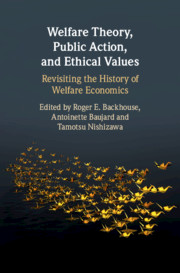Book contents
- Welfare Theory, Public Action, and Ethical Values
- Welfare Theory, Public Action, and Ethical Values
- Copyright page
- Contents
- Figures and Tables
- Contributors
- Acknowledgements
- Introduction: Revisiting the History of Welfare Economics
- Part I Plurality of Welfare in the Making of Welfare Economics
- Part II Developing Modern Welfare Economics
- 7 John Hicks’s Farewell to Economic Welfarism
- 8 Individualism and Ethics
- 9 Non-welfarism in the Early Debates over the Coase Theorem
- 10 Musgrave and the Idea of Community
- 11 Non-welfaristic Features of Kenneth Arrow’s Idea of Justice
- 12 Beyond Welfarism
- 13 The Influence of Sen’s Applied Economics on His Non-welfarist Approach to Justice
- 14 Conclusion
- Index
- References
10 - Musgrave and the Idea of Community
from Part II - Developing Modern Welfare Economics
Published online by Cambridge University Press: 04 March 2021
- Welfare Theory, Public Action, and Ethical Values
- Welfare Theory, Public Action, and Ethical Values
- Copyright page
- Contents
- Figures and Tables
- Contributors
- Acknowledgements
- Introduction: Revisiting the History of Welfare Economics
- Part I Plurality of Welfare in the Making of Welfare Economics
- Part II Developing Modern Welfare Economics
- 7 John Hicks’s Farewell to Economic Welfarism
- 8 Individualism and Ethics
- 9 Non-welfarism in the Early Debates over the Coase Theorem
- 10 Musgrave and the Idea of Community
- 11 Non-welfaristic Features of Kenneth Arrow’s Idea of Justice
- 12 Beyond Welfarism
- 13 The Influence of Sen’s Applied Economics on His Non-welfarist Approach to Justice
- 14 Conclusion
- Index
- References
Summary
Richard A. Musgrave (1910-2007) is the architect of modern public finance. Born and educated in Germany, Musgrave was a widely read scholar who fought attempts to narrow the scope and methods of economics. He had always been critical of what we now call welfarism, and more generally of strict methodological individualism. This chapter reviews the history of Musgrave’s connection with the idea of community. Musgrave’s limited opening – often implicit – for the idea of community provides a basis for an alternative conception of welfare. He realised the importance of a social or communal frame late in his life and left cursory remarks. Musgrave never fully articulated a coherent vision of what the idea of community belonging might entail for a democratic theory of the government’s budget. Yet, securing an ontological status for societies or communities allowed him to theorise a larger scope for public interventions than other economic models of the state. It provided a new meaning to his concept of merit wants. Reframing merit wants as ‘community wants’ is explained by the revival of moral and political philosophy in the 1970s and revisiting older German theories.
Keywords
- Type
- Chapter
- Information
- Welfare Theory, Public Action, and Ethical ValuesRevisiting the History of Welfare Economics, pp. 232 - 255Publisher: Cambridge University PressPrint publication year: 2021
References
- 8
- Cited by

